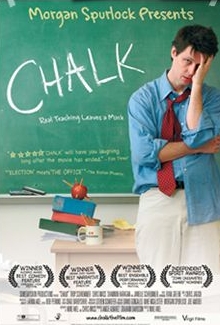
In one of our Ed Psych lectures we got to watch the documentary "Chalk". It was quite an entertaining and hilarious perspective of new teachers in a high school. It documented the teaching careers of four new teachers, and highlighted the mishaps as well as the blunders that new teachers encounter. It showed that teaching is not necessarily for everyone, and that some people may or may not be cut out for the teaching profession. It raises questions about the theory that you can teach anyone to be a teacher.
Although the documentary had some quite funny clips, it sometimes seemed like the film was mocking the teaching profession with the questionable methods of teaching, and the crazy characters that the teachers documented were. Despite sometimes giving teachers a bad rapport, I think that Morgan Spurlock's intent was to highlight the fact that teaching is not in any way easy. In my opinion, it was a way to emphasize the role and powerful effect of a great and positive teacher.
If you are interested in seeing the film, or you're in a good mood for a laugh, check out the trailer for "Chalk": http://www.youtube.com/watch?v=bpmc_NBLbNM
Although the documentary had some quite funny clips, it sometimes seemed like the film was mocking the teaching profession with the questionable methods of teaching, and the crazy characters that the teachers documented were. Despite sometimes giving teachers a bad rapport, I think that Morgan Spurlock's intent was to highlight the fact that teaching is not in any way easy. In my opinion, it was a way to emphasize the role and powerful effect of a great and positive teacher.
If you are interested in seeing the film, or you're in a good mood for a laugh, check out the trailer for "Chalk": http://www.youtube.com/watch?v=bpmc_NBLbNM





